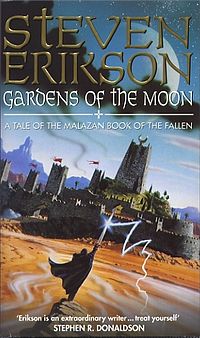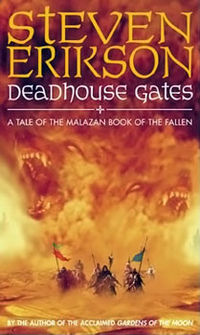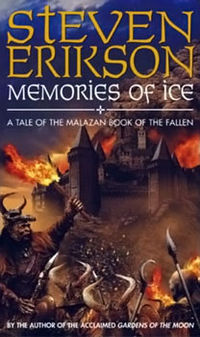The First Three Books of The Malazan Book of the Fallen Series: A Primer and Review
The Malazan Book of the Fallen Series:
Gardens of the Moon (1999), Deadhouse Gates (2000), Memories of Ice (2001)
by Steven Erikson
One of the main hurdles epic fantasy has had to overcome has been making inroads with the literary crowds. However, in his piece “Easy Writers” for The New Yorker, Arthur Krystal observes that “the distinction between genre fiction and literary fiction has, of late, gotten less clear. Writers we once thought of as guilty pleasures are being granted literary status.” In a response to Krystal’s article, Lev Grossman wrote in a piece for Time that:
We expect literary revolutions to come from above, from the literary end of the spectrum — the difficult, the avant-garde, the high-end, the densely written. But I don’t think that’s what’s going on. Instead we’re getting a revolution from below, coming up from the supermarket aisles. Genre fiction is the technology that will disrupt the literary novel as we know it.
I think everyone can agree that good writing is good writing, irrespective of genre. Admittedly, for a while — particularly while I was in grad school — I’d been turning my nose up at sci-fi and fantasy (SF/F), ignoring the fact that the main reasons I wanted to become a writer in the first place were rooted in those two genres. Only upon closer inspection did I discover sub-genres, hidden within the minutia of those broad, overarching designations, particularly “epic-” or “high-fantasy” and “hard science fiction,” terms — similar to “surrealism” and “postmodernism” in that the practitioners of of each basically cringe at the labels — that showed me I was on the right track for discovering guilt-free SF/F reading that was also . . . dare I say it? . . . literary!
Gardens of the Moon opens with the armies of the Malazan Empire battling the free native city-states for dominance. It’s during an attempt by the Bridgeburners, one of the Malazans’ elite military units, to seize control of Darujhistan that we pick up the plotline. Epic events quickly begin to unfold from there.
Though it’s been mentioned around bookish corners of the Internet before, it certainly does bear repeating: do not expect much in the way of setup in Gardens of the Moon — Erikson sends you hurtling, face-first, into the Malazan universe where upon you land directly in the middle of the significant conflict I mentioned above. It can be a disorienting, even jarring experience. While the threat of an impending invasion by an oppressive empire seems like a bad thing, you still aren’t completely sure who to root for; you can’t definitively say who is “good” and who is “bad” (a distinction, like in Martin’s novels, that becomes increasingly more blurry as the series progresses); you are never totally sure of the stakes.
You just know shit is about to go down.
July 8th, 2013 / 11:00 am



